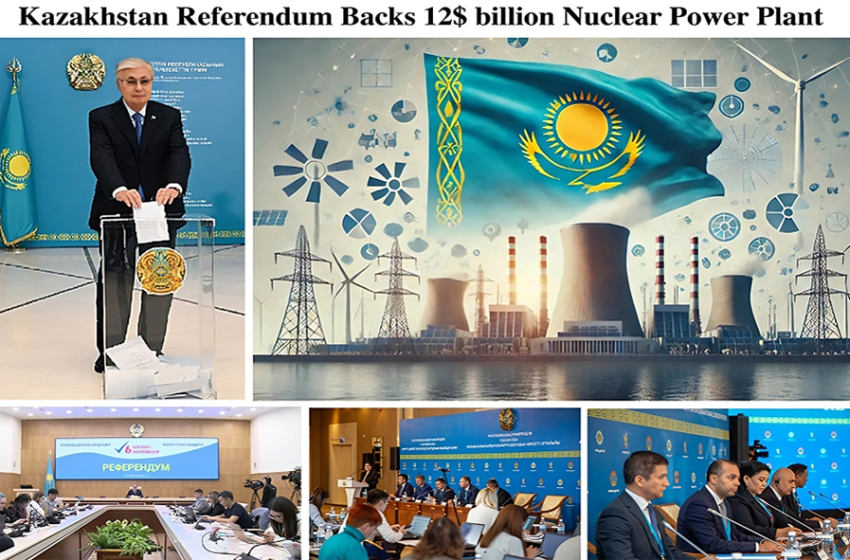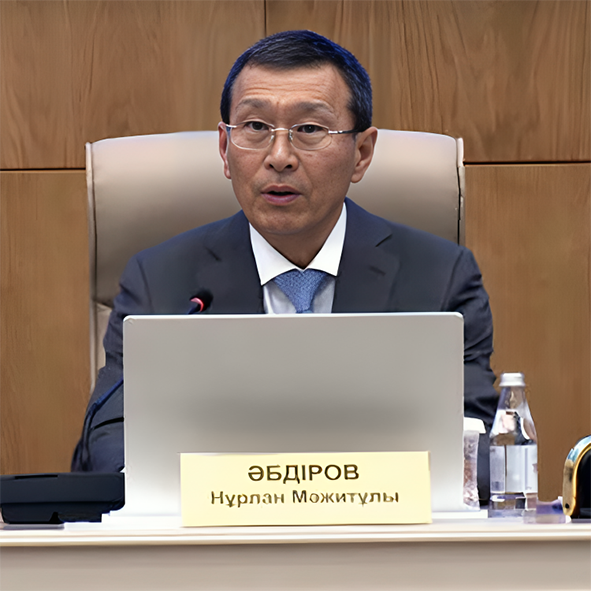eNovate and Cobi Launch Large-Scale AI-Powered Digital Payment Infrastructure
Kazakhstan Referendum Backs $12 billion Nuclear Power Plant

ASTANA— Almaty “Kazakhstan”
Kazakhstan votes on Sunday in a referendum on building the country’s first nuclear power station as the world’s top uranium producer looks to boost its power generation capacity, while the power station is due to be built near the semi-abandoned village of Ulken in the Kazakh steppes.
The Central Election Commission (CEC) of Kazakhstan has announced the preliminary results of an Oct. 6 national referendum on the construction of a nuclear power plant.
“As of 8 a.m. of Oct. 7, the votes at 10,323 polling stations in all regions of the country and abroad have been tallied,” said CEC Chairman Nurlan Abdirov at an Oct. 7 press briefing.
A total of 12,284,487 Kazakh citizens were eligible to participate in the vote. Of this, 7,820,204 citizens cast their ballots, representing a 63.66% voter turnout.
The question posed to the citizens was whether they supported the construction of a nuclear power plant in the country. Based on the preliminary results, an overwhelming majority of voters, totalling 5,561,937 people or 71.12%, voted in favor of the construction. Conversely, 2,045,271 people, or 26.15%, voted against the nuclear power plant.
Central Election Commission
Kazakhstan’s Central Election Commission has accredited 177 observers from 30 countries and four international organizations, including the CIS Observer Mission, the Shanghai Cooperation Organization (SCO), the Organisation of Turkic States, and the Conference on Interaction and Confidence-Building Measures in Asia (CICA).
CIS Observers Commend Referendum Process, meanwhile Leonid Anfimov, head of the (CIS) observer mission noted that the observers monitored both the preparation and conduct of the referendum, with 74 accredited representatives from Azerbaijan, Belarus, the Kyrgyz Republic, Russia, Tajikistan, Uzbekistan and staff from the CIS Executive Committee.
More than 70% of people who voted in Kazakhstan’s referendum have backed new nuclear energy in the country.
Preliminary results released by the Central Election Commission of the Republic of Kazakhstan, show that in Sunday’s referendum there was a 63% turnout, with 71.12% of the 7.8 million people who voted answering yes to the question: “Do you agree with the construction of a nuclear power plant in Kazakhstan?”
President Tokayev’s Support

President Kassym-Jomart Tokayev announced last year that a referendum would be held, and has said the country was in “dire need of reliable and environmentally-friendly” sources of energy, that nuclear could “largely” meet the rapidly growing needs of the Kazakh economy, but any decision on nuclear must be taken with the support of the people.
President Tokayev, said:” it will be “the biggest project in the history of independent Kazakhstan” and the “Yes” campaign has dominated ahead of the vote, and to ensure a high turnout, Kazakhs are being allowed to vote even if they are not enrolled on electoral registers and riding on buses in major cities is free for the day”.
“The referendum in itself is more proof of the enormous changes in Kazakhstan over the past five years — another clear demonstration of the concept of a state that listens,” Tokayev said ahead of the vote.
After voting in the referendum on Sunday President Tokayev answered questions from the media, including about who would be chosen to build the new nuclear energy plant. He said: “This is not an easy problem. The government should analyse and conduct appropriate negotiations. In my opinion, an international consortium consisting of world companies with the most advanced technologies should work in Kazakhstan.”
Out of the total votes, 130,267 ballots were deemed invalid. Additionally, 82,729 ballots were recognized as valid but were not included in the final tally because voters had marked two answers instead of one, which disqualified their ballots.
Voting patterns vary across the regions. The Turkistan Region recorded the highest number of votes in favor, with 693,766 citizens supporting the nuclear plant and 178,148 voting against it. The Almaty Region followed closely, where 495,291 voters supported the construction and 174,622 opposed it.
The total number of Kazakh citizens who voted in 59 countries was 9,976. This ensured a turnout of 81.06%.
Kazakhstan’s foreign missions in 59 countries have established 74 referendum precincts, with a total of 12,307 registered voters.
Following briefings with international observers of organizations such as the Shanghai Cooperation Organization, the Organization of Turkic States, and the Conference on Interaction and Confidence Building Measures in Asia, mission heads affirmed the referendum’s openness and legitimacy, with no violations reported at polling stations.
International observers also highlighted the high voter turnout. More than 200 foreign journalists are also covering the referendum.
Polling stations for Kazakhstan’s referendum on the construction of a nuclear power plant were first opened in several Asian countries, including Japan and South Korea.
Observers Delegations Notes
The OTS observers delegation reported on well-prepared polling stations with clear information about procedures available to voters and said: “Election commissions granted full access to international and local observers, ensuring transparency throughout the process. The voting process was professionally managed, and no major irregularities were observed. The procedures for voting and counting were followed meticulously, ensuring transparency. No instances of unlawful interior interference by administrative or law enforcement authorities were observed. Voters’ rights were fully respected with no obstacles reported,” said Sadi Jafarov, head of the OTS observer mission and the organization’s deputy secretary general.
“Observers encountered no technical difficulties that would have affected the outcome and public order was maintained at polling stations. There were no reports of campaign materials, coercion by political groups, or other illegal activities during the voting process,” he added.
On behalf of the OTS observer mission, Jafarov affirmed that the referendum was conducted openly, transparently, and in compliance with Kazakhstan’s relevant legislation and internationally accepted electoral standards.
The report by the CICA observer mission highlighted the transparency during the referendum and the active participation of youth and said: “Transparency of voting was well ensured. There was unimpeded observation and presentation of opinions of public organizations and international observers. The entire referendum process, including preparation, campaigning and voting day, was widely and promptly covered by the media,” said Zhang Ling, CICA deputy secretary general.
Aims Until 2060
Alberto Frigerio is a professor of international relations at Almaty Management University said: “Kazakhstan has long debated building a nuclear power plant, with President Kassym-Jomart Tokayev emphasizing the economic and political importance of such a move. However, public opinion remains divided due to the country’s legacy as a Soviet-era nuclear testing site.
Kazakhstan also plans to transition to a greener economy, aiming to become carbon-neutral by 2060. The country has so far increased renewable energy to around 6% of its electricity production. Nuclear energy is expected to play a key role in this transition, helping Kazakhstan meet its growing energy demands while reducing greenhouse gas emissions.
Kazakhstan is the world’s leading producer of uranium. Although it does not currently use nuclear energy, it is not without nuclear experience: it has three operating research reactors, and a Russian-designed BN-350 sodium-cooled fast reactor operated near Aktau for 26 years, until 1999.








